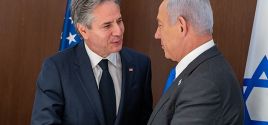SAS men get £100,000 to bribe Iraqi fightersBy David LeppardThe Sunday Times Dec. 02, 2006 |
Popular 
House Passes 'Antisemitism Awareness Act' to Silence Criticism of Israel as Hate Speech

Zionist Mob Attacks Pro-Palestine Protesters at UCLA While Screaming 'Second Nakba'

"I've Never Seen This Many Police": NYPD Launch Crackdown on Pro-Palestine Protesters at Columbia

'We Own This Country': Mark Levin Says Pro-Palestine Protesters Should be 'Rounded Up and Deported'

Israel-Ukraine $95B Aid Bill Includes Provision to 'Supercharge Mass Migration From the Middle East'
 BRITISH Army officers in Iraq are being handed stashes of up to £100,000 in cash for “operational expenses” without formal controls on how it is spent. The money is used by the SAS and other units to buy off leaders of the insurgency or to purchase weapons on the black market to avoid them passing into rebel hands. The decades-old tradition of paying so-called “porter money” to officers is understood to be the focus of a wide-ranging internal inquiry in the SAS. It follows allegations earlier this year that hundreds of thousands of pounds may have been misappropriated during SAS covert operations in Iraq and elsewhere in the Middle East. The Sunday Times has obtained a photograph of a British officer smiling broadly as he holds nearly £60,000 worth of Iraqi dinars — still less than the maximum allowance. The cash, in crisp new notes, is neatly stacked in bundles that he holds to his chest. The officer, said to be a captain in the SAS, told friends that the money — 158m Iraqi dinars — was part of a secret stash kept at the barracks at Basra Palace in southern Iraq. He claimed it was used to bribe locals suspected of collaborating with rebels loyal to Abu Musab al-Zarqawi, the Al-Qaeda leader in Iraq, and to buy weapons on the black market. “It’s held in a drawer in a room at the back of the palace. The SAS just walk in and take it out in a bag,” an insider said. The picture was taken in March this year and was circulated by the officer — whose name The Sunday Times is withholding for security reasons — in e-mails to his friends and family. There is no suggestion that he has acted improperly with the money. Ken Connor, a former SAS soldier who is now a military historian, said “porter money” was first used by the SAS when it was fighting rebels in the jungles of Malaya and Borneo in the 1950s. Connor said: “It was used to pay locals who were employed as porters to help carry the regiment’s heavy equipment through the jungle. “The accountability is very loose. It’s got to be because being in the SAS is not like being in a normal nine to five job. But I’ve never heard of such large amounts being available. If there’s a job where you can get £100,000 without having to account for it, please count me in.” Connor said the regiment’s use of “porter money” had sparked a previous investigation. “There was a big scandal during the Dhofar campaign,” he said, referring to SAS operations in Oman during the early 1970s. The Ministry of Defence said that it was the department’s policy not to discuss special forces matters. The ease with which SAS officers have been given access to such large sums of cash has raised eyebrows among colleagues in other units. The alleged irregularities came to light after concerns were raised about the purchase of aviation fuel and other supplies for a secret mission. Sources said military investigators queried some of the invoices. There are suggestions that they may have been inflated and the extra cash channelled elsewhere. A senior officer with extensive special forces experience flew to Iraq this month to take part in an inquiry into the affair. The SAS has always been able to secure funds for its special operations without going through the bureaucratic processes to which other regiments are subject. Other units in Iraq have also occasionally been granted “porter money” in special circumstances. A review of the whole system of “porter money” is now likely. A friend of one SAS officer said: “He told me they were getting into trouble about the money, that other soldiers were asking questions about why they had so much money. He said they were probably going to have to find a better way of doing it.” A source said inquiries were looking into covert accounts used by the elite regiment to finance operations against Al-Qaeda terrorists and insurgents in Iraq and Afghanistan. “Investigators are going through the SAS accounts,” said the source. “They are investigating every penny that’s gone through the SAS in recent years.” |



